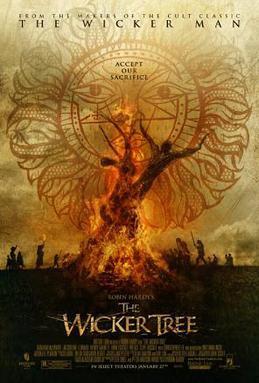
October brings horror films to mind. As soon as the calendar clicks over, discussions of favorite scary movies begins. As I’ve mentioned many times before, it is the one time of year when those of us who watch horror don’t feel so odd. It is a little strange, however, to be watching movies related to The Wicker Man at this time of year. As holiday horror that particular movie is set at the other end of the year, in May. So I had to see The Wicker Tree, something I’ve avoided doing all these years. Neither properly a sequel nor a remake, The Wicker Tree is Robin Hardy’s re-envisioning of the story with a larger budget. There’s no way to prove it, but it seems likely that it was released in response to the unfortunate remake of The Wicker Man in 2006.
There are any number of things that could be said about The Wicker Tree, not least of which is that it’s clear Anthony Shaffer was a far better screenwriter than Robin Hardy. (Shaffer had written a sequel, more properly conceived, which has not been filmed.) Robin Hardy was, of course, the director of the original movie. Plagued by low budget, rushed filming, and lack of production company support, The Wicker Man nevertheless soared. The Wicker Tree is what is termed a “spiritual successor”—it doesn’t directly carry on the story of the original, but draws its inspiration from it. It was based on a novel written by Hardy titled Cowboys for Christ. Two evangelical missionaries are sent to Scotland to convert as many lapsed Christians as they can. Of course, their invitation to Tressock is a trap so they can be sacrificed on May Day.
Despite the many unanswered questions the film leaves, to someone raised evangelical it seems that Robin Hardy really doesn’t understand what evangelicals are. Beth and Steve, on their tour through the lowlands, do things evangelicals just wouldn’t do. They drink, they dance, they swear, they play cards. The only thing he seemed to get about evangelicals is they like to sing and talk about Jesus and hand out pamphlets. This is something I often see is movies—those who try to portray evangelicals haven’t actually been evangelical themselves and don’t understand them. I also find this in my interactions with British colleagues all the time—they don’t really comprehend what evangelicalism is. That could be a topic for its own post. In any case, The Wicker Tree has its moments, but it’s convoluted, cynical, and off-the-mark. It may’ve been intended as a spiritual successor, but its prototype required no re-envisioning.
